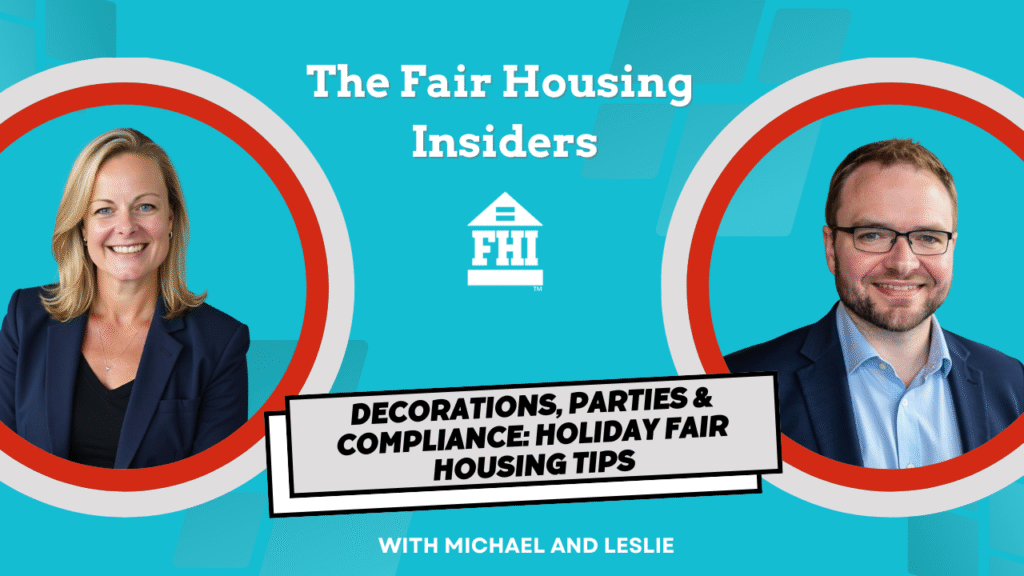The holiday season brings a unique energy to housing communities. From sparkling decorations to cheerful gatherings, property managers often strive to create a warm and welcoming atmosphere for their residents. However, along with the fun comes an important responsibility: ensuring that holiday activities and displays comply with the Fair Housing Act. What might seem like a harmless decoration or a simple party invitation could unintentionally signal favoritism toward one group of residents and exclusion of another.
By thinking ahead and adopting consistent practices, housing providers can celebrate the season while maintaining compliance and protecting resident relationships. Let’s explore key areas where holiday traditions often overlap with fair housing concerns—and how to handle them with care.

Table of Contents
Decorations in Common Areas
Seasonal decor is often the first sign that the holiday season has arrived. Yet, it’s also one of the easiest areas for unintentional mistakes. Decorations displayed in shared spaces, such as the leasing office, lobby, or community clubhouse, must avoid the appearance of endorsing any particular faith. For example, an elaborate display of only one religion’s symbols may leave residents of other faiths feeling overlooked.
To avoid this, property managers should lean toward seasonal, non-religious themes. Items like snowflakes, wreaths, pinecones, or string lights bring a festive spirit without focusing on a single belief system. HUD even considers Christmas trees to be a non-religious decoration, making them permissible. What should be avoided are overtly religious items such as nativity scenes or Stars of David, which can be seen as management promoting one faith over another. Another safe option is to simply forgo decorations altogether, but for communities that enjoy being festive, neutrality and balance are the best approaches.
Hosting Resident Events
Resident gatherings are a great way to bring communities together, but they come with their own set of challenges. If management sponsors an event, it should remain neutral in both name and content. Calling an event a “Christmas Party” or including prayers and religious rituals can create compliance issues. Instead, consider neutral names like “Holiday Social” or “Winter Celebration,” and focus on activities that unite residents without religious overtones. Importantly, ensure every resident receives an invitation. Even the perception that one group is excluded can cause problems.
On the other hand, residents themselves have the right to host religious events, provided their community policies permit it. For example, a group of residents may want to hold a Hanukkah dinner or church potluck in a community space. That’s permissible, but the key is consistency. If one group is allowed to reserve the room, others must have the same opportunity under the same conditions. Management cannot allow one type of religious event while rejecting another. Maintaining equal access ensures fairness and reduces the risk of discrimination claims.
Flyers and Bulletin Boards
The holiday season also brings an increase in postings about community events, food drives, and donation opportunities. While these flyers can strengthen community spirit, they also create risks if not handled carefully. If a property permits postings on community bulletin boards or sends out announcements, it must allow both religious and non-religious content. Picking and choosing which events to highlight, for example, allowing promotion of a church food drive but denying a mosque’s event, could be considered religious discrimination.
The best practice is to establish a neutral posting policy. This might include limiting postings to nonprofit organizations, requiring pre-approval from management, or restricting notices to specific categories, such as charitable events. Whatever rules you adopt, apply them consistently. Inconsistent enforcement is one of the most common causes of complaints. Residents should feel confident that their group has the same opportunities as any other, and staff should never be left making judgment calls about which organizations are “acceptable.”
Consistency Is Key
Consistency is the common thread in every holiday-related fair housing issue. Whether it’s decorations, resident events, or use of bulletin boards, the same standards must apply across the board. Allowing one group a privilege while denying it to another, whether intentionally or unintentionally, opens the door to claims of favoritism and discrimination.
This is why it’s critical for property owners and managers to agree on clear policies before the season begins. Decide whether you will permit decorations, allow resident-sponsored religious gatherings, or permit flyer postings, and then enforce those decisions evenly at all properties. Leaving decisions to individual staff members or handling them on a case-by-case basis creates confusion and increases liability. A consistent and well-communicated approach helps prevent misunderstandings and ensures that seasonal celebrations are fair for everyone.
The Importance of Training
Even with strong policies in place, staff must be trained to recognize potential issues and apply the rules consistently. The holiday season brings added stress and distractions, making it easy for well-meaning employees to overlook compliance requirements. Regular fair housing training ensures that all staff members are aware of which decorations are appropriate, how to handle resident requests, and what company policies apply.
Training also empowers staff to answer resident questions with confidence and authority. When residents see that management applies rules fairly and communicates decisions clearly, trust is built. This not only helps avoid complaints but also contributes to a more positive overall community atmosphere. In short, fair housing training is the foundation for keeping the holidays festive while protecting residents’ rights and safeguarding your property from liability.
You may also like:
- Preventing Staff Harassment in Property Management
- Fair Housing Liability: When Does Resident-on-Resident Harassment Trigger Management’s Duty to Act?
- Retaliation vs. Rule Enforcement: Navigating the Fair Housing Fine Line
- Top 3 Fair Housing Risks for Property Managers in 2026
- A Year of Upheaval: How 2025 Impacted Fair Housing Operations
